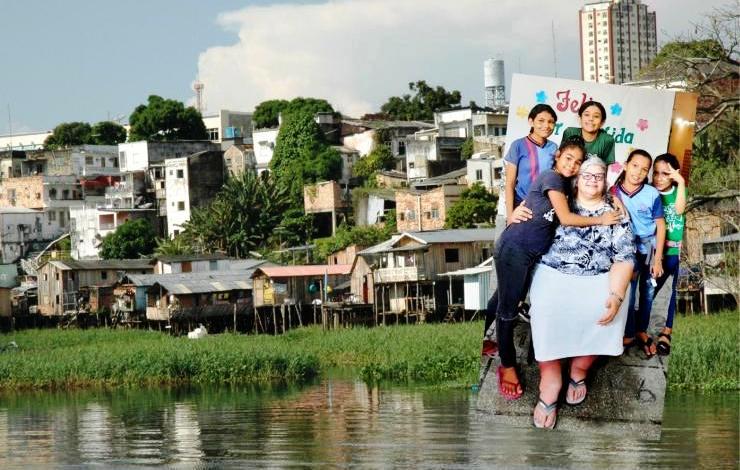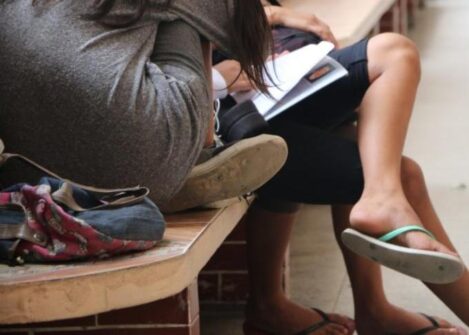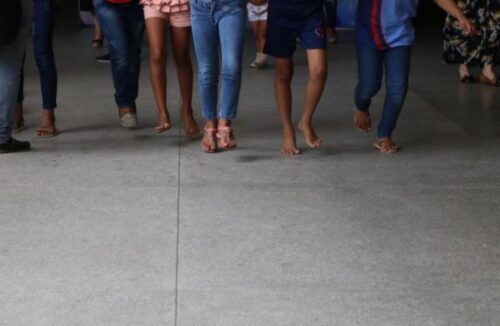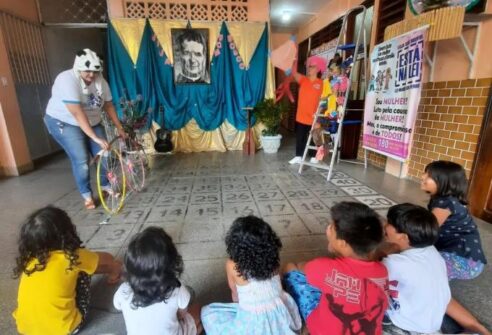Brazil. Manaus. Sister Liliana and children of the favelas.

On the outskirts of the capital of the state of Amazonas, the Casa Mamãe Margarida school helps vulnerable girls to find hope and the concreteness of the Gospel in education and training. Sr. Liliana Daou Lindoso, the Salesian Sister in charge of the house, tells us about it.
St. Joseph the Worker is a dormitory neighbourhood of Manaus, capital of the Brazilian state of Amazonas. In the morning, many men from the favela go to work in the industrial district, leaving the women and children in the shanty town where people live in extremely poor conditions. In the factory, you earn very little, not even enough to make ends meet. And the little money raised is often spent on drink, so much so that alcoholism is a widespread scourge here.

“Many of them were on the street, abandoned to a life full of all kinds of dangers.” Photo: William Costa/Portal Amazônia
“When I came in 1987, the situation was bleak with families in difficulty, people suffering from mental illnesses, the lack of food and malnourishment among children. Many of them were on the street, abandoned to a life full of all kinds of dangers.” The story of Sr. Liliana Daou Lindoso, a member of the Daughters of Mary Help of Christians, also known as Salesians, who manages the Casa Mamãe Margarida in Manaus, is a journey into juvenile distress seen through the lens of reception facilities and the Santa Maria Mazzarello school opened in 1997. This suburb sprang up in a hurry and social problems have multiplied together with the inhabitants: dilapidated housing, poverty, hunger, petty crime and drug trafficking are the reality in which young people grow up. “Our girls are children who belong to a reality of material and also spiritual poverty – says Sister Liliana -. They are people who have no basis of faith, no moral structure. Many are weak and influenced by superstition: they range from attendance at sects to spiritism and the macumba.”
Poverty and Violence
The children “need lots of love – explains the Salesian -. They need time to open up and talk about their problems. They must believe in God and be able to distinguish God the Father the Creator from the flesh and blood father who hurts and uses them. For them, we are sowers of hope in building a life project that will make them protagonists of their own history. Our service was born for children and has developed to fit families. The community asked us to help young people with serious existing problems and difficulties in attending school. Girls on the margins, poor, from the countryside, without documents: truly an educational challenge.”

“I was already back on the street when three young girls told me about a place where they had been welcomed and respected”. Photo: William Costa/Portal Amazônia
Maria was one of them. She is now a psychologist and coordinator of school activities, where she trained herself. She tells us: “I arrived at Casa Mamãe Margarida at the age of nine, after running away from a state kindergarten where I ended up because I lived on the street. I suffered all sorts of violence but I had to survive. At home, my mother and stepfather treated me badly. I then ran away to the centre of Manaus, to the port on the Rio Negro River where there were boats. Every now and then I would get into one and set off not knowing where I was going.”
She continues: “Every time I came home it was worse, for seven years I suffered physical violence from my mother’s man and she would beat me with a piece of wood for not taking care of my siblings. I was already back on the street when three young girls told me about a place where they had been welcomed and respected. At first, I didn’t believe it, but then I decided to give it a try.”
“When I arrived at Casa Mamãe Margarida, I was in a terrible state, without hope. But there, for the first time in my life I felt loved and had the opportunity to become the protagonist of my life. I learned to read and write at the age of 10 and I never stopped learning.”

Photo: William Costa/Portal Amazônia
Like Maria, many little girls are the protagonists of Sister Liliana’s testimony. “From 14-year-old girls with a child in their arms to the teenager who comes to us with self-harm problems”. Sister Liliana’s voice slows down, her tone is lower. She sighs and then concludes: “But we are daughters of dreamers and so we carry on our work with great faith in providence. And in the human person’s ability to recover.” (Sr. Sister Liliana with children of the favelas – Photo: William Costa/Portal Amazônia)
Miela Fagiolo D’Attilia/PM



